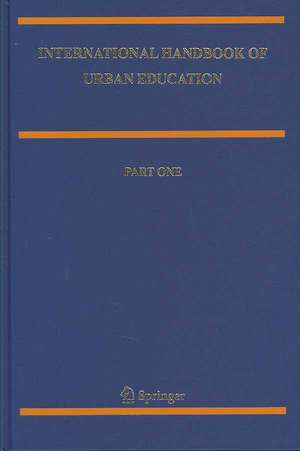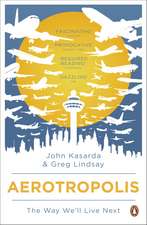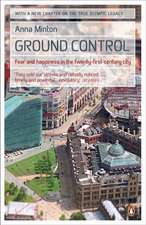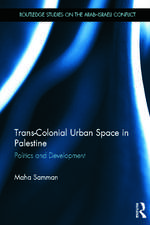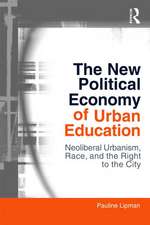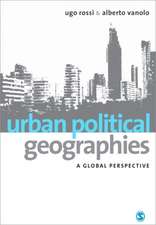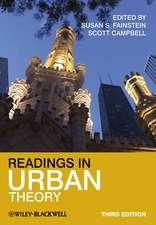International Handbook of Urban Education: Springer International Handbooks of Education, cartea 19
Editat de William T. Pink, George W. Nobliten Limba Engleză Hardback – 4 ian 2008
What has emerged from recent work to improve urban schools is the insight that there is no one-size-fits-all panacea. Rather, we have discovered that the local context shapes, in critically important ways, what will be effective at the school level. The universality of the problematics with urban education, together with the importance of understanding the local, or situated, context of improvement interventions, brings into sharp focus the importance and timeliness of an undertaking like the International Handbook of Urban Education.
An important focus of the International Handbook of Urban Education will be the interrogation of both the social and political factors that lead to different problem posing and subsequent solutions within each region. An important question to be answered, for example, is what it takes in terms of resources, political will and policy actions to improve urban education.
Din seria Springer International Handbooks of Education
- 18%
 Preț: 2566.01 lei
Preț: 2566.01 lei - 20%
 Preț: 2524.89 lei
Preț: 2524.89 lei - 18%
 Preț: 2495.78 lei
Preț: 2495.78 lei - 18%
 Preț: 2787.65 lei
Preț: 2787.65 lei - 18%
 Preț: 2509.03 lei
Preț: 2509.03 lei - 18%
 Preț: 2528.13 lei
Preț: 2528.13 lei - 24%
 Preț: 3424.63 lei
Preț: 3424.63 lei - 18%
 Preț: 2557.33 lei
Preț: 2557.33 lei - 18%
 Preț: 4736.83 lei
Preț: 4736.83 lei - 18%
 Preț: 2500.50 lei
Preț: 2500.50 lei - 20%
 Preț: 3447.68 lei
Preț: 3447.68 lei - 18%
 Preț: 2562.04 lei
Preț: 2562.04 lei - 18%
 Preț: 1917.28 lei
Preț: 1917.28 lei - 18%
 Preț: 3868.23 lei
Preț: 3868.23 lei - 18%
 Preț: 3082.96 lei
Preț: 3082.96 lei - 18%
 Preț: 3078.36 lei
Preț: 3078.36 lei - 18%
 Preț: 5421.52 lei
Preț: 5421.52 lei - 18%
 Preț: 4707.16 lei
Preț: 4707.16 lei - 18%
 Preț: 5517.65 lei
Preț: 5517.65 lei - 18%
 Preț: 3071.11 lei
Preț: 3071.11 lei - 18%
 Preț: 3089.10 lei
Preț: 3089.10 lei - 24%
 Preț: 2423.35 lei
Preț: 2423.35 lei - 24%
 Preț: 3706.67 lei
Preț: 3706.67 lei - 24%
 Preț: 2659.57 lei
Preț: 2659.57 lei - 24%
 Preț: 2731.14 lei
Preț: 2731.14 lei - 18%
 Preț: 4392.57 lei
Preț: 4392.57 lei - 24%
 Preț: 1695.06 lei
Preț: 1695.06 lei - 24%
 Preț: 2733.86 lei
Preț: 2733.86 lei - 24%
 Preț: 2638.94 lei
Preț: 2638.94 lei - 24%
 Preț: 1629.97 lei
Preț: 1629.97 lei - 24%
 Preț: 1863.18 lei
Preț: 1863.18 lei - 24%
 Preț: 3410.60 lei
Preț: 3410.60 lei - 24%
 Preț: 2649.91 lei
Preț: 2649.91 lei - 24%
 Preț: 2581.81 lei
Preț: 2581.81 lei - 24%
 Preț: 3592.50 lei
Preț: 3592.50 lei - 24%
 Preț: 2698.04 lei
Preț: 2698.04 lei - 24%
 Preț: 2642.96 lei
Preț: 2642.96 lei - 24%
 Preț: 2712.48 lei
Preț: 2712.48 lei - 24%
 Preț: 4135.01 lei
Preț: 4135.01 lei - 24%
 Preț: 3656.36 lei
Preț: 3656.36 lei
Preț: 2675.83 lei
Preț vechi: 3520.83 lei
-24% Nou
Puncte Express: 4014
Preț estimativ în valută:
512.18€ • 556.53$ • 430.51£
512.18€ • 556.53$ • 430.51£
Carte tipărită la comandă
Livrare economică 17-23 aprilie
Preluare comenzi: 021 569.72.76
Specificații
ISBN-13: 9781402051982
ISBN-10: 1402051980
Pagini: 724
Ilustrații: XLVI, 1267 p. In 2 volumes, not available separately.
Dimensiuni: 155 x 235 x 60 mm
Greutate: 2.58 kg
Ediția:2007
Editura: SPRINGER NETHERLANDS
Colecția Springer
Seria Springer International Handbooks of Education
Locul publicării:Dordrecht, Netherlands
ISBN-10: 1402051980
Pagini: 724
Ilustrații: XLVI, 1267 p. In 2 volumes, not available separately.
Dimensiuni: 155 x 235 x 60 mm
Greutate: 2.58 kg
Ediția:2007
Editura: SPRINGER NETHERLANDS
Colecția Springer
Seria Springer International Handbooks of Education
Locul publicării:Dordrecht, Netherlands
Public țintă
ResearchCuprins
Africa.- Urban Education in Africa: Section Editors' Introduction.- Urbanization and Schooling in Africa: Trends, Issues, and Challenges from Ghana during the Colonial Era.- Language Education in Cameroon: From the Colonial Era to the 21st Century.- The Politics of National Culture and Urban Education Reforms in Post-Independent Zimbabwe.- Reforming the City School in South Africa: Mapping the History from Apartheid Durban to Post-Apartheid eThekwini.- Urban Primary Schooling in Malawi: Opportunities and Challenges.- Ethnicity, Politics, and State Resource Allocation: Explaining Educational Inequalities in Kenya.- Dimensions of Diversity: Educating Urban Township Learners, a Case of Umlazi Township School in Durban, South Africa.- The Middle School Climate in Senegal: The Case of the Diourbel Middle School1.- Urban Education Differentials and Marginalization: The Case of Educating the Youth in Nairobi's Informal Settlements.- Asia Pacific.- Urban Education in Asia Pacific: Section Editors'Introduction.- Urban-Rural Disparities in Educational Equality: China's Pressing Challenge in a Context of Economic Growth and Political Change.- Equity and Social Justice in Australian Education Systems: Retrospect and Prospect.- The Urban and the Peripheral: New Challenges for Education in the Pacific.- Ducked or Bulldozed? Education of Deprived Urban Children in India.- Withering the State? Globalization Challenges and Changing Higher Education Governance in East Asia.- Madrasah and Muslim Education: Its Interface with Urbanization.- Women in East Asian Education and Society: Whose Gains in Whose Perspectives?.- Framing Lives: Longitudinal Research on Life Planning and Pathways in Singapore.- New Urban Terrains: Literacies, World Kids, and Teachers.- Western Europe.- Urban Educationin Europe: Section Editors'Introduction.- Globalisation and Glocalisation in Northern Spain: Urban Education, Ethnicity and Multicultural Issues.- School Differentiation and Segregation in the Parisian Periphery: An Analysis of Urban Schools' Logics of Action and their Effects.- Urban Citizenship.- Territorial Stigmatisation, Hip Hop and Informal Schooling.- Between the Road and the Town: An Ethnographic Study of the Education of Traveling Attractionists.- The Limits of Compensatory Education in Spain: A Comparative Analysis of Some Autonomous Governments.- Dutch Urban Schools and Teachers' Professionalism.- Urban Regions and their Potential for Teacher Education: The Hamburg Example.- Latin America.- Urban Education in Latin America: Section Editor's Introduction.- History of Brazilian Urban Education: Space and Time in Primary Schools.- Learning Cycles: Transition Policies for a New Logic of Compulsory Schooling in Brazil.- School Failure and Public Schools: Theoretical and Pedagogical Challenges in Brazil.- Chilean Educational Reform: The Intricate Balance Between a Macro and Micro Policy.- Public Policies and Educational Equity in the City of Bogota.- Primary Education: Changing Mainstay of Uruguay.- Educational Policies and Realities: Teachers' Initial Education in Mexico.- Learning to Work in an Industrial Mexican City in Transition (1990–2000).- The Fragmented Composition of the Argentinean Educational System.- North America.- Urban Education in North America: Section Editor's Introduction.- Imagining the Urban: The Politics of Race, Class, and Schooling.- Persuasive, Pervasive, and Limiting: How Causal Explanations Shape Urban Educational Research and Practice.- The New Immigrants: Shaping the Urban Educational Landscape.- Urban Schooling in SuburbanContexts: Exploring the Immigrant Factor in Urban Education.- Urban School Reform: To What End?.- Success Stories in Urban Education: A Critical Look at the Ethic of Care in Programs, Projects, and Strategies that Work from the Classroom to Community.- Rebuilding Schools, Restoring Communities: A Vision of Urban Educational Evaluation.- United Kingdom.- Urban Education in the United Kingdom: Section Editors' Introduction.- History of Urban Education in the United Kingdom.- Urban Education Theory Revisited: From the Urban Question to End of Millennium.- Combating Racism in Schooling: A Critical Perspective on Contemporary Policy and Practice.- Reforming Urban Education Systems.- Urban Learning and the Need for Varied Urban Curricula and Pedagogies.- Leading Schools in High Poverty Neighborhoods: The National College for School Leadership and Beyond.- Urban School Improvement.- Urban Schools: Performance, Competition and Collaboration.- The Governance of Urban Education in the UK: A Public, Private or Partnership Future?.- Multi-Agency Working in Urban Education and Social Justice.- Future Directions for Urban Education in the UK.- Coda.- Coda: An Urban Education Dystopia.- Urban Education Dystopia, 2050.- Urban Education Dystopia, 2050: A Response from Africa.- Urban Education Dystopia, 2050: A Response from the Asia Pacific.- Urban Education Dystopia, 2050: A Response from Europe.- Urban Education Dystopia, 2050: A Response from Latin America.- Urban Education Dystopia, 2050: A Response from North America.- Urban Education Dystopia, 2050: A Response from the United Kingdom.
Textul de pe ultima copertă
It is evident that urban education has become the central focus of educators at the present time. In the U.S., for example, almost one third of all school age children attend schools in large urban school districts. It is in these urban schools where the diversity of cultures and languages is highest and where student learning is most problematic.
What has emerged from recent work to improve urban schools is the insight that there is no one-size-fits-all panacea. Rather, we have discovered that the local context shapes, in critically important ways, what will be effective at the school level. The universality of the problematics with urban education, together with the importance of understanding the local, or situated, context of improvement interventions, brings into sharp focus the importance and timeliness of an undertaking like the International Handbook of Urban Education.
An important focus of the International Handbook of Urban Education will be the interrogation of both the social and political factors that lead to different problem posing and subsequent solutions within each region. An important question to be answered, for example, is what it takes in terms of resources, political will and policy actions to improve urban education.
What has emerged from recent work to improve urban schools is the insight that there is no one-size-fits-all panacea. Rather, we have discovered that the local context shapes, in critically important ways, what will be effective at the school level. The universality of the problematics with urban education, together with the importance of understanding the local, or situated, context of improvement interventions, brings into sharp focus the importance and timeliness of an undertaking like the International Handbook of Urban Education.
An important focus of the International Handbook of Urban Education will be the interrogation of both the social and political factors that lead to different problem posing and subsequent solutions within each region. An important question to be answered, for example, is what it takes in terms of resources, political will and policy actions to improve urban education.
Caracteristici
Functions as a survey of the definitions, practices, problematics and solutions concerning worldwide urban education Includes 8-10 manuscripts from each of eight regions worldwide: Africa, Asia, Austral-Asia, Caribbean, Europe, Latin/South America, North America, United Kingdom Each section comprises cutting-edge work on urban education written by the major scholars working in that region The cross-regional, cross-cultural views enable readers to think about pressing urban education issues outside of their own cultural assumptions Themes woven throughout all the sections: migration; diaspora; educational policies; policy and economic development; politics and educational goals; definitions of urban and urban education; success stories; strategies for reform; evaluation
